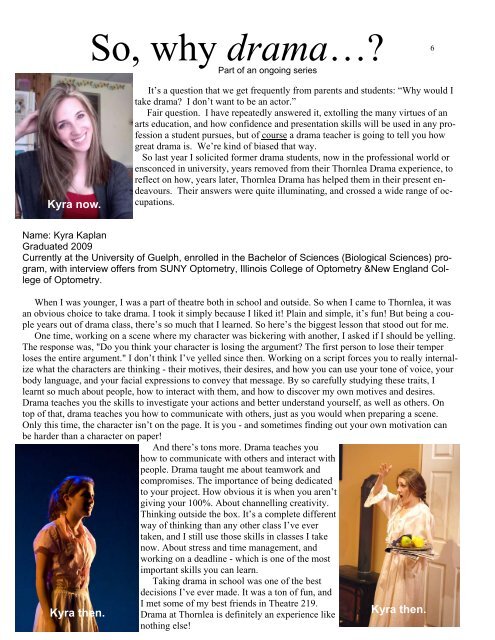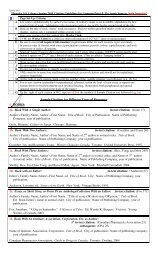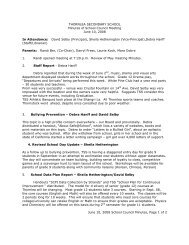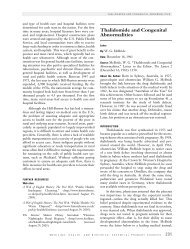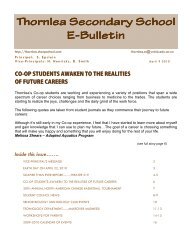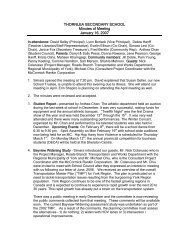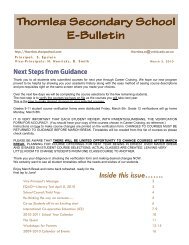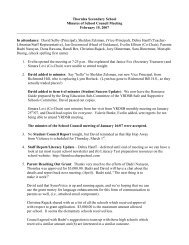Create successful ePaper yourself
Turn your PDF publications into a flip-book with our unique Google optimized e-Paper software.
So, why drama…<br />
6<br />
Part of an ongoing series<br />
Kyra now.<br />
It’s a question that we get frequently from parents and students: “Why would I<br />
take drama I don’t want to be an actor.”<br />
Fair question. I have repeatedly answered it, extolling the many virtues of an<br />
arts education, and how confidence and presentation skills will be used in any profession<br />
a student pursues, but of course a drama teacher is going to tell you how<br />
great drama is. We’re kind of biased that way.<br />
So last year I solicited former drama students, now in the professional world or<br />
ensconced in university, years removed from their <strong>Thornlea</strong> Drama experience, to<br />
reflect on how, years later, <strong>Thornlea</strong> Drama has helped them in their present endeavours.<br />
Their answers were quite illuminating, and crossed a wide range of occupations.<br />
Name: Kyra Kaplan<br />
Graduated 2009<br />
Currently at the University of Guelph, enrolled in the Bachelor of Sciences (Biological Sciences) program,<br />
with interview offers from SUNY Optometry, Illinois College of Optometry &New England College<br />
of Optometry.<br />
When I was younger, I was a part of theatre both in school and outside. So when I came to <strong>Thornlea</strong>, it was<br />
an obvious choice to take drama. I took it simply because I liked it! Plain and simple, it’s fun! But being a couple<br />
years out of drama class, there’s so much that I learned. So here’s the biggest lesson that stood out for me.<br />
One time, working on a scene where my character was bickering with another, I asked if I should be yelling.<br />
The response was, "Do you think your character is losing the argument The first person to lose their temper<br />
loses the entire argument." I don’t think I’ve yelled since then. Working on a script forces you to really internalize<br />
what the characters are thinking - their motives, their desires, and how you can use your tone of voice, your<br />
body language, and your facial expressions to convey that message. By so carefully studying these traits, I<br />
learnt so much about people, how to interact with them, and how to discover my own motives and desires.<br />
Drama teaches you the skills to investigate your actions and better understand yourself, as well as others. On<br />
top of that, drama teaches you how to communicate with others, just as you would when preparing a scene.<br />
Only this time, the character isn’t on the page. It is you - and sometimes finding out your own motivation can<br />
be harder than a character on paper!<br />
And there’s tons more. Drama teaches you<br />
how to communicate with others and interact with<br />
people. Drama taught me about teamwork and<br />
compromises. The importance of being dedicated<br />
to your project. How obvious it is when you aren’t<br />
giving your 100%. About channelling creativity.<br />
Thinking outside the box. It’s a complete different<br />
way of thinking than any other class I’ve ever<br />
taken, and I still use those skills in classes I take<br />
now. About stress and time management, and<br />
working on a deadline - which is one of the most<br />
important skills you can learn.<br />
Taking drama in school was one of the best<br />
decisions I’ve ever made. It was a ton of fun, and<br />
I met some of my best friends in Theatre 219.<br />
Kyra then. Drama at <strong>Thornlea</strong> is definitely an experience like Kyra then.<br />
nothing else!


